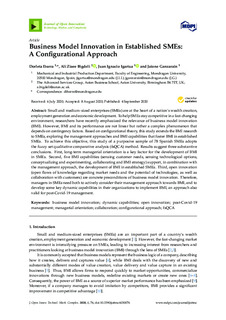| dc.rights.license | Attribution 4.0 International | * |
| dc.contributor.author | Ibarra, Dorleta | |
| dc.contributor.author | Igartua, Juan Ignacio | |
| dc.contributor.author | Ganzarain, Jaione | |
| dc.contributor.other | Bigdeli, Ali Ziaee | |
| dc.date.accessioned | 2023-03-22T16:00:39Z | |
| dc.date.available | 2023-03-22T16:00:39Z | |
| dc.date.issued | 2020 | |
| dc.identifier.issn | 2199-8531 | en |
| dc.identifier.other | https://katalogoa.mondragon.edu/janium-bin/janium_login_opac.pl?find&ficha_no=162877 | en |
| dc.identifier.uri | https://hdl.handle.net/20.500.11984/6058 | |
| dc.description.abstract | Small and medium-sized enterprises (SMEs) are at the heart of a nation’s wealth creation, employment generation and economic development. To help SMEs stay competitive in a fast-changing environment, researchers have recently emphasized the relevance of business model innovation (BMI). However, BMI and its performance are not linear but rather a complex phenomenon that depends on contingency factors. Based on configurational theory, this study extends the BMI research to SMEs, exploring the management approaches and BMI capabilities that foster BMI in established SMEs. To achieve this objective, this study of a purposive sample of 78 Spanish SMEs adopts the fuzzy set qualitative comparative analysis (fsQCA) method. Results suggest three substantive conclusions. First, long-term managerial orientation is a key factor for the development of BMI in SMEs. Second, five BMI capabilities (sensing customer needs, sensing technological options, conceptualizing and experimenting, collaborating and BMI strategy) support, in combination with the management approach, the development of BMI in established SMEs. Third, open innovation (open flows of knowledge regarding market needs and the potential of technologies, as well as collaboration with customers) are concrete preconditions of business model innovation. Therefore, managers in SMEs need both to actively consider their management approach towards BMI, and to develop some key dynamic capabilities in their organizations to implement BMI, an approach also valid for post-Covid-19 management. | en |
| dc.language.iso | eng | en |
| dc.publisher | MDPI | en |
| dc.rights | © 2020 The Authors | en |
| dc.rights.uri | http://creativecommons.org/licenses/by/4.0/ | * |
| dc.subject | business model innovation | en |
| dc.subject | dynamic capabilities | en |
| dc.subject | open innovation | en |
| dc.subject | post-Covid-19 management | en |
| dc.subject | managerial orientation | en |
| dc.subject | Collaboration | en |
| dc.subject | configurational approach | en |
| dc.subject | fsQCA | en |
| dc.title | Business Model Innovation in Established SMEs: A Configurational Approach | en |
| dc.type | http://purl.org/coar/resource_type/c_6501 | |
| dcterms.accessRights | http://purl.org/coar/access_right/c_abf2 | en |
| dcterms.source | Journal of Open Innovation: Technology, Market, and Complexity | en |
| local.contributor.group | Innovación, gestión, organización | es |
| local.description.peerreviewed | true | en |
| local.identifier.doi | https://doi.org/10.3390/joitmc6030076 | en |
| local.rights.publicationfee | APC | en |
| local.rights.publicationfeeamount | 724 EUR 800 CHF | en |
| local.contributor.otherinstitution | https://ror.org/05j0ve876 | es |
| local.source.details | Vol. 6. N. 3. N. artículo 76 | en |
| oaire.format.mimetype | application/pdf | en |
| oaire.file | $DSPACE\assetstore | en |
| oaire.resourceType | http://purl.org/coar/resource_type/c_6501 | en |
| oaire.version | http://purl.org/coar/version/c_970fb48d4fbd8a85 | en |








